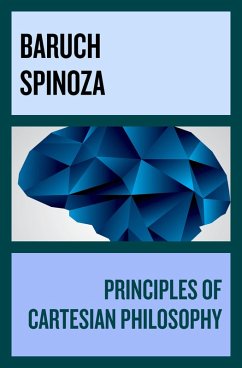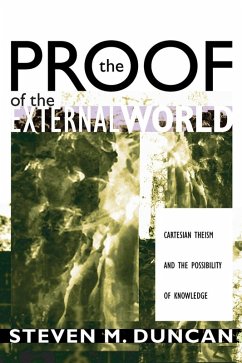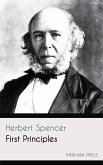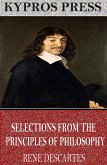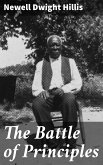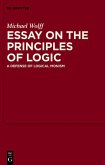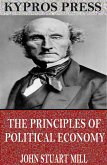13,95 €
inkl. MwSt.
Sofort per Download lieferbar

7 °P sammeln
- Format: ePub
- Merkliste
- Auf die Merkliste
- Bewerten Bewerten
- Teilen
- Produkt teilen
- Produkterinnerung
- Produkterinnerung

Bitte loggen Sie sich zunächst in Ihr Kundenkonto ein oder registrieren Sie sich bei
bücher.de, um das eBook-Abo tolino select nutzen zu können.
Hier können Sie sich einloggen
Hier können Sie sich einloggen
Sie sind bereits eingeloggt. Klicken Sie auf 2. tolino select Abo, um fortzufahren.

Bitte loggen Sie sich zunächst in Ihr Kundenkonto ein oder registrieren Sie sich bei bücher.de, um das eBook-Abo tolino select nutzen zu können.
This book provides depth and insight into the philosophical doctrine of Rene Descartes, and compares it to the metaphysics of Spinoza himself.
- Geräte: eReader
- ohne Kopierschutz
- eBook Hilfe
- Größe: 1.46MB
Andere Kunden interessierten sich auch für
![The Proof of the External World (eBook, ePUB) The Proof of the External World (eBook, ePUB)]() Steven M. DuncanThe Proof of the External World (eBook, ePUB)15,95 €
Steven M. DuncanThe Proof of the External World (eBook, ePUB)15,95 €![First Principles (eBook, ePUB) First Principles (eBook, ePUB)]() Herbert SpencerFirst Principles (eBook, ePUB)0,91 €
Herbert SpencerFirst Principles (eBook, ePUB)0,91 €![Selections from the Principles of Philosophy (eBook, ePUB) Selections from the Principles of Philosophy (eBook, ePUB)]() René DescartesSelections from the Principles of Philosophy (eBook, ePUB)1,82 €
René DescartesSelections from the Principles of Philosophy (eBook, ePUB)1,82 €![The Battle of Principles (eBook, ePUB) The Battle of Principles (eBook, ePUB)]() Newell Dwight HillisThe Battle of Principles (eBook, ePUB)0,49 €
Newell Dwight HillisThe Battle of Principles (eBook, ePUB)0,49 €![Essay on the Principles of Logic (eBook, ePUB) Essay on the Principles of Logic (eBook, ePUB)]() Michael WolffEssay on the Principles of Logic (eBook, ePUB)111,95 €
Michael WolffEssay on the Principles of Logic (eBook, ePUB)111,95 €![The Principles of Political Economy (eBook, ePUB) The Principles of Political Economy (eBook, ePUB)]() John Stuart MillThe Principles of Political Economy (eBook, ePUB)1,82 €
John Stuart MillThe Principles of Political Economy (eBook, ePUB)1,82 €![Fundamental Principles of the Metaphysic of Morals (eBook, ePUB) Fundamental Principles of the Metaphysic of Morals (eBook, ePUB)]() Immanuel KantFundamental Principles of the Metaphysic of Morals (eBook, ePUB)2,99 €
Immanuel KantFundamental Principles of the Metaphysic of Morals (eBook, ePUB)2,99 €-
-
-
This book provides depth and insight into the philosophical doctrine of Rene Descartes, and compares it to the metaphysics of Spinoza himself.
Produktdetails
- Produktdetails
- Verlag: Philosophical Library/Open Road
- Seitenzahl: 200
- Erscheinungstermin: 2. Dezember 2014
- Englisch
- ISBN-13: 9781497675766
- Artikelnr.: 44362619
- Verlag: Philosophical Library/Open Road
- Seitenzahl: 200
- Erscheinungstermin: 2. Dezember 2014
- Englisch
- ISBN-13: 9781497675766
- Artikelnr.: 44362619
- Herstellerkennzeichnung Die Herstellerinformationen sind derzeit nicht verfügbar.
Baruch or Benedict de Spinoza was a Dutch philosopher of Portuguese Jewish origin. Born Benedito de Espinosa; 24 November 1632 - 21 February 1677, in Amsterdam, the son of Portuguese Jewish refugees who had fled from the persecution of the Spanish Inquisition. Although reared in the Jewish community, he rebelled against its religious views and practices, and at the age of 24 was formally excommunicated from the Portuguese-Spanish Synagogue of Amsterdam. He was thus effectively cast out of the Jewish world and joined a group of nonconfessional Christians (although he never became a Christian), the Collegiants, who professed no creeds or practices but shared a spiritual brotherhood. He was also involved with the Quaker mission in Amsterdam. Spinoza eventually settled in The Hague, where he lived quietly, studying philosophy, science, and theology, discussing his ideas with a small circle of independent thinkers, and earning his living as a lens grinder. He corresponded with some of the leading philosophers and scientists of his time and was visited by Leibniz and many others. He is said to have refused offers to teach at Heidelberg or to be court philosopher for the Prince of Conde. During his lifetime he published only two works, The Principles of Descartes' Philosophy (1666) and the Theological Political Tractatus (1670). In the first his own theory began to emerge as the consistent consequence of that of Descartes. In the second, he gave his reasons for rejecting the claims of religious knowledge and elaborated his theory of the independence of the state from all religious factions. It was only after his death (probably caused by consumption resulting from glass dust), that his major work, the Ethics, appeared in his Opera Posthuma. This work, in which he opposed Descartes' mind-body dualism, presented the full metaphysical basis of his pantheistic view. Today, he is considered one of the great rationalists of 17th-century philosophy, laying the groundwork for the 18th century Enlightenment and modern biblical criticism. Spinoza's influence on the Enlightenment, on the Romantic Age, and on modern secularism has been of extreme importance. Dr. Dagobert D. Runes, the founder of the Philosophical Library, and Albert Einstein were not only close friends and colleagues; they both regarded Spinoza as the greatest of modern philosophers.
